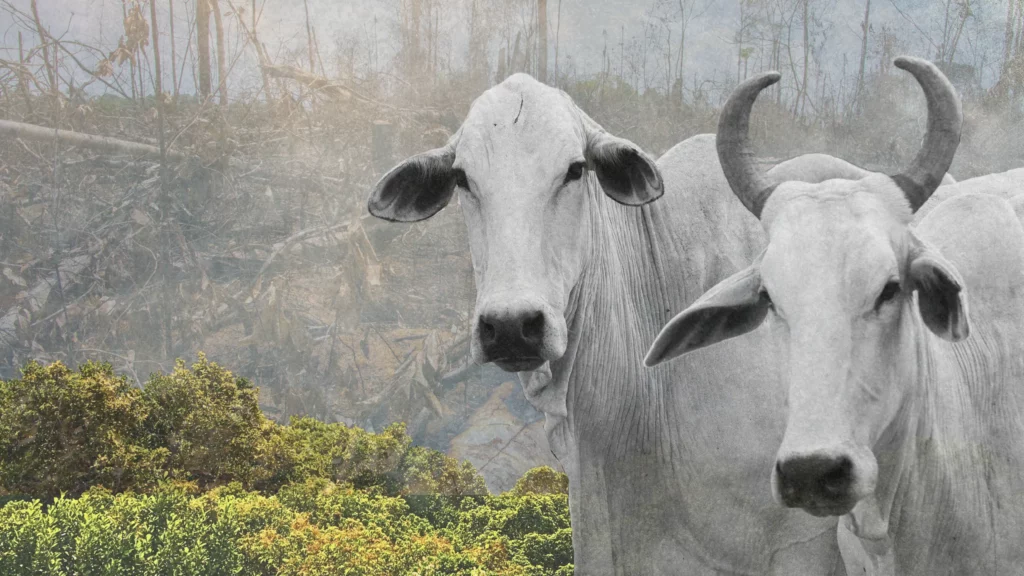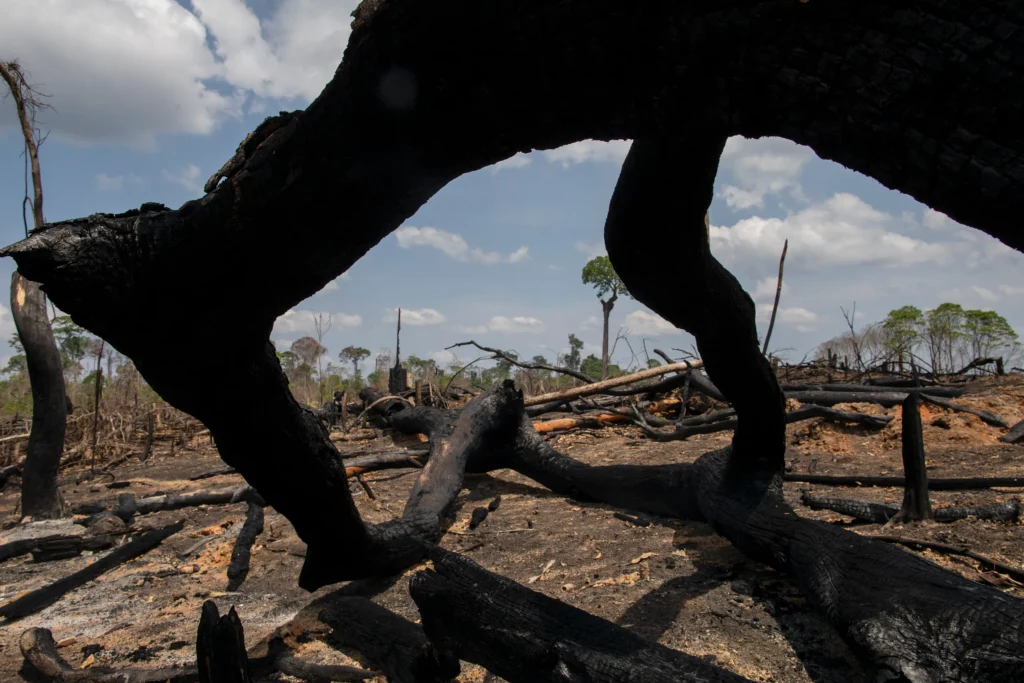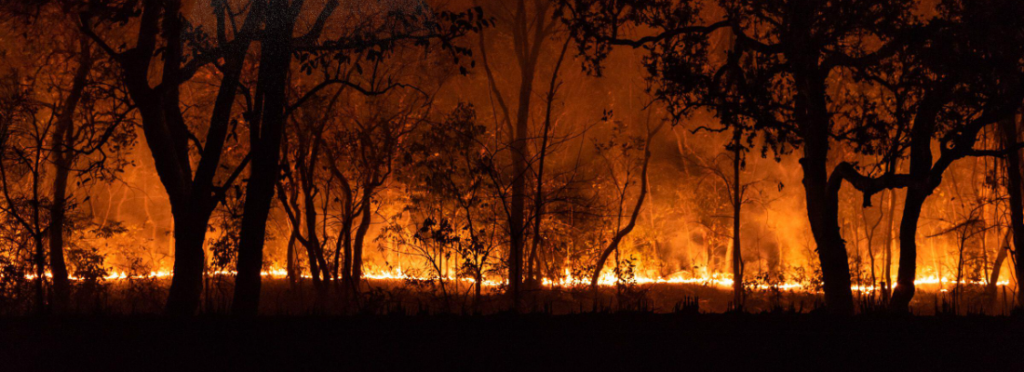Over 800 Million Trees Felled to Feed Appetite for Beef from Brazil
ENVIRONMENT, 12 Jun 2023
Andrew Wasley, et al. | The Bureau of Investigative Journalism – TRANSCEND Media Service

A composite of Brazilian cattle against a backdrop of deforestation.
Credits: João Laet/Repórter Brasil/The Guardian; Canva
2 Jun 2023 – More than 800 million trees have been cut down in the Amazon rainforest in just six years to feed the world’s appetite for Brazilian beef, despite dire warnings about the forest’s importance in fighting the climate crisis.
A data-driven investigation by TBIJ, the Guardian, Repórter Brasil and Forbidden Stories shows systematic and vast forest loss linked to cattle farming.
The beef industry in Brazil has previously pledged to avoid farms linked to deforestation. However, the new data reveals that 17,000 sq km of the Amazon was destroyed near meat plants exporting beef around the world.
The investigation is part of Forbidden Stories’ Bruno and Dom Project. It continues the work of Bruno Pereira, an Indigenous peoples expert and Dom Phillips, a Guardian journalist, who were murdered in the Amazon last year.
Deforestation across Brazil soared between 2019 and 2022 under President Jair Bolsonaro, with cattle ranching the number one culprit. The new administration of President Luiz Inacio Lula da Silva has promised to curb the destruction.
Researchers at the consultancy AidEnvironment used satellite imagery, livestock movement records and other data to calculate forest loss between 2017 and 2022 on thousands of ranches near more than 20 slaughterhouses. All the meat plants were owned by Brazil’s big three beef exporters – JBS, Marfrig and Minerva.
To find the farms that most likely supplied each slaughterhouse, the researchers looked at “buying zones”; these are areas based on transport connections and other factors, and, where possible, confirmed by interviews with plant representatives. All the meat plants exported internationally, including to the EU, the UK and China, the world’s biggest buyer of Brazilian beef.
The research focused on slaughterhouses in the states of Mato Grosso, Pará and Rondônia – important frontiers of deforestation associated with ranching. It’s likely that the overall figure for deforestation on farms supplying JBS, Marfrig and Minerva is higher, because they run other plants elsewhere in the Amazon.
Nestlé and the German meat company Tönnies, which had supplied Lidl and Aldi, were among those who had bought from the meat plants featured in the study. Dozens of wholesale buyers, some of which supply the catering businesses that serve schools and hospitals, also appeared in the list of buyers.
Nestlé said two of the three meatpackers were not currently part of its supply chain, and added: “We may scrutinize business relationships with our suppliers who are unwilling or unable to address gaps in compliance with our standards.”
Tönnies said: “These Brazilian companies process many thousands of animals per year for export,” and claimed it was unclear whether the company had received products from plants linked to deforestation.
Lidl and Aldi said they stopped selling Brazilian beef in 2021 and 2022, respectively.

More than 17,000 sq km of rainforest was felled in the areas around meat plants in the Brazilian Amazon. João Laet/Repórter Brasil/The Guardian
TO READ FULL REPORT Go to Original – thebureauinvestigates.com
________________________________________________
Reporters: Andrew Wasley, Elisângela Mendonça, Youssr Youssef and Robert Soutar
Additional reporting: André Campos (Repórter Brasil), Jeroen Wester, Karlijn Kuijpers (NRC), Eduardo Goulart (OCCRP), Julius Bretzel, Dajana Kollig, Carina Huppertz (Paper Trail Media)
Research: Aidenvironment
Environment editor: Robert Soutar
Editor: Meirion Jones
Production: Frankie Goodway
Impact producer: Grace Murray
Fact checker: Emily Goddard
Special thanks: Kuang Keng Kuek Ser
Our Food and Farming project is partly funded by Quadrature Climate Foundation and partly by the Hollick Family Foundation. None of our funders have any influence over our editorial decisions or output. This story was supported by the Pulitzer Center’s Rainforest Investigations Network.
The Bureau of Investigative Journalism is an independent not-for-profit organisation that holds power to account. We find the facts to expose wrongs and spark change. We tell the stories that matter. Established in April 2010, the Bureau is the first of its kind in the UK, where philanthropically funded journalism is rare. Our team of journalists bolsters original news by producing high-quality investigations for press and broadcast media with the aim of educating the public and the media on both the realities of today’s world and the value of honest reporting.
Please support our work – share this article.
Tags: Amazon, Carbon Dioxide, Cattle and Ranch Farmers, Climate Change, Deforestation, Ecology, Environment, Fauna, Flora, Forest fires, Global warming, Indigenous Rights, Meat Industry, Native cultures, Rain Forests, Violence against Animals
DISCLAIMER: The statements, views and opinions expressed in pieces republished here are solely those of the authors and do not necessarily represent those of TMS. In accordance with title 17 U.S.C. section 107, this material is distributed without profit to those who have expressed a prior interest in receiving the included information for research and educational purposes. TMS has no affiliation whatsoever with the originator of this article nor is TMS endorsed or sponsored by the originator. “GO TO ORIGINAL” links are provided as a convenience to our readers and allow for verification of authenticity. However, as originating pages are often updated by their originating host sites, the versions posted may not match the versions our readers view when clicking the “GO TO ORIGINAL” links. This site contains copyrighted material the use of which has not always been specifically authorized by the copyright owner. We are making such material available in our efforts to advance understanding of environmental, political, human rights, economic, democracy, scientific, and social justice issues, etc. We believe this constitutes a ‘fair use’ of any such copyrighted material as provided for in section 107 of the US Copyright Law. In accordance with Title 17 U.S.C. Section 107, the material on this site is distributed without profit to those who have expressed a prior interest in receiving the included information for research and educational purposes. For more information go to: http://www.law.cornell.edu/uscode/17/107.shtml. If you wish to use copyrighted material from this site for purposes of your own that go beyond ‘fair use’, you must obtain permission from the copyright owner.
